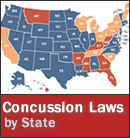There’s been all sorts of legislative action in recent weeks from states that don’t already have youth-concussion laws on the books.
Below, I’ve broken down the latest, state-by-state, and updated our youth-concussion-legislation map to reflect the changes.
For your reference, the three oft-referenced key provisions of states’ youth-concussion legislation are: Parents must sign a concussion-information form before their child can participate in sports; student-athletes suspected of a concussion must be immediately removed from play; and student-athletes removed for a concussion must obtain medical clearance before returning.
Arkansas: The state Senate unanimously passed its youth-concussion bill on March 25 and placed it on the House calendar the next day.
If passed, the only thing the Arkansas bill would do is establish a pilot project on concussion management, using up to $1 million from the state department of education’s General Improvement Fund. Unlike most states’ youth-concussion laws, the Arkansas bill says nothing about removing student-athletes suspected of a concussion from play, informing parents about the symptoms of a concussion, or requiring a concussed student-athlete to obtain medical clearance before returning to play.
Georgia: The state Senate approved its youth-concussion bill by a 49-3 vote on March 26. The state House previously approved the bill back on March 1, meaning it now presumably heads to Gov. Nathan Deal for a signature.
The Georgia bill contains the main three components of most states’ youth-concussion laws, but Georgia goes one step further by extending these requirements to private schools, charter schools, and youth sports outside of school. Only a handful of current youth-concussion laws do so.
Montana: The state Senate approved its youth-concussion bill on Feb. 9 and sent it to the House two days later, but the House didn’t conduct its first reading until March 7. The bill was sent to the House education committee, which passed it unanimously on March 26, so it should next head back to the full House chamber.
The Montana bill contains all three of the major provisions of youth-concussion legislation, and also requires mandatory annual concussion training for coaches, athletic trainers, and sports officials.

South Carolina: After the state’s House committee on education and public works voted in favor of its youth-concussion bill on March 11, the full House unanimously approved it nine days later. It was read for the first time in the Senate on March 21, then sent to the Senate committee on education, where it currently resides.
If passed, the South Carolina bill contains the three key provisions of youth-concussion legislation. The bill does not require any sort of formal concussion training for coaches, athletic trainers, or other school officials.
Tennessee: After unanimously passing through the Senate on Feb. 28, the House voted 93-3 in favor of its youth-concussion legislation on March 21. The Senate speaker signed the bill on March 26 and the House speaker signed it March 27, which leaves the legislation presumably ready to be transmitted to Gov. Bill Haslam for a signature.
If signed into law, the Tennessee bill would require the three typical provisions, along with required annual concussion training for coaches and school athletic directors.
West Virginia: After it was introduced at the end of February, the state Senate unanimously approved its youth-concussion legislation on March 26. The bill moved from there to the House judiciary committee on March 27, where it’s currently being considered.
If approved, the West Virginia bill contains all three typical provisions of youth-concussion legislation, while also requiring coaches to undergo an annual concussion-training program.
Last, and in this case least: By my count (and the NFL’s), Mississippi continues to be the only state that either doesn’t already have a youth-concussion law or isn’t actively considering youth-concussion legislation. A few youth-concussion bills were introduced during the 2013 legislative session, but all died in committee.
The Mississippi High School Activities Association does have its own youth-concussion policy, however, which contains the typical removal-from-play and medical-clearance provisions, but does not require parents to sign a concussion-information form before their child participates in sports.
Remember to keep checking our youth-concussion-law map for all the latest legislative updates regarding student-athletes and concussions.